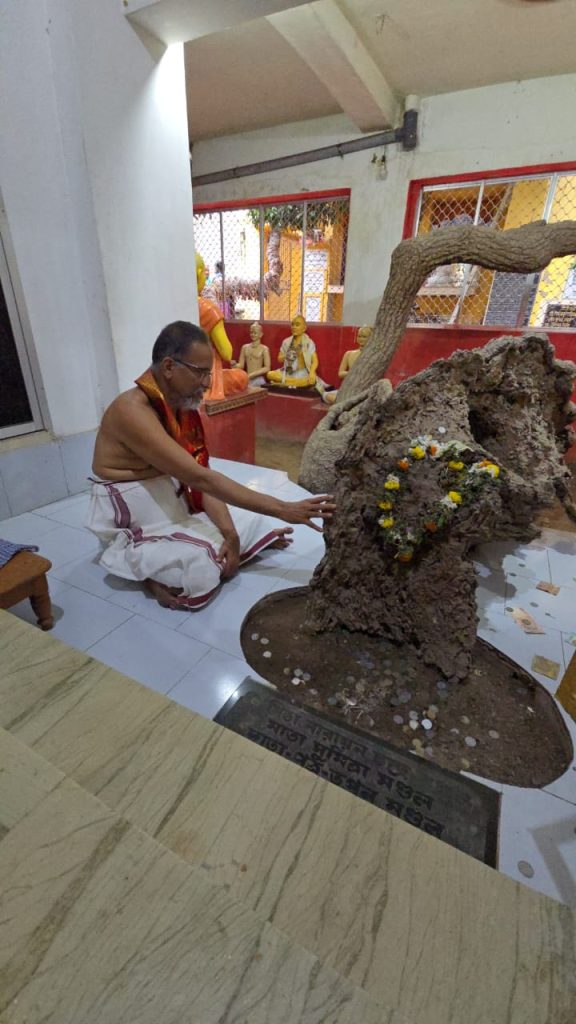Blissful Darshan of Jagannatha Kannan – 2
Sri Hari:
All night long I thought of Sri Haridasa Thakura. I felt that the essence of Puri was in Sri Haridasa Thakura’s samadhi. The 11th canto of Srimad Bhagavatam speaks of the greatness of haridasas (devotees of Sri Hari). God may be patient with us for a while, but if we continue to test His patience, even He may punish us. Even the devas are like that. Did Indra not try to destroy Gokula not even heeding the fact that it was Bhagavan who had stopped the yAga that was due to him? This is the nature of devas.
However, in the case of haridasas, not only would they not retaliate or harm those who trouble or hurt them, but on the other hand they would also think of them compassionately and pray wholeheartedly for their well-being. Such a devotee indeed was Sri Haridasa Thakura. He was a Muslim by birth. But he had deep devotion towards Sri Krishna. He would constantly chant the Mahamantra, day and night. He would chant 3 lakh Nama each day. Some people who could not brook this, beat him up hard and threw him into the Ganga river, in an almost dying state. They left thinking that he was dead. He survived by the grace of Mother Ganga and began to pray with tear-filled eyes for the well-being of the those who had beaten him up, worrying that their hands would ache with the strain of having thrashed him. This is indeed the greatness of haridasas! The greatness of such sadhus is spoken of by Krishna’s father Vasudeva to Sage Narada in the second chapter of the 11th canto of Srimad Bhagavatam.
भूतानाां देवचरितां दुः खाय च सुखाय च ।
सुखायैव हि साधूनाां त्वादृशामच्य तात्मनाम्॥
bhUtAnAm devacharitam dukkhAya cha sukhAya cha |
sukhAyaiva hi sAdhUnAm tvAdrushAnAmachyutAtmanAm ||
The actions of devas like Indra lead to both joy and sorrow for humans. But the actions of sadhus bring about only happiness for mankind.
All places where the Mahamantra is chanted continuously, bring great joy and are very dear to my heart.
Many years ago, when I first visited Swami Abhedananda’s ashram and entered ‘Namavedi’, the place where Mahamantra kirtan takes place continuously, I swooned and fell down.
Recently, when I had been to Tiruvananthapuram for a Bhagavata Saptaham, I went whenever possible to Abhedanandasramam and chanted the Mahamantra. Once when I was chanting there, I visibly experienced a divine power entering within me through my fingertips.
Another place that similarly brings immense joy to my heart is the brindavan of Sri Raghunathadas Goswami situated near Radhakund in Vrindavan. In that divine place, feeling that his Guru’s happiness was indeed the prime goal of his life, Sri Raghunathadas chanted Mahamantra day and night while surviving on only one glass of milk a day, and lived in the bhAva of being Sri Radha Devi’s servitor. Performing Mahamantra kirtan in this divine place also gives immense bliss. When we simply think of such mahans, our mind experiences an inexplicable joy. Raghunatha Dasa performed Mahamantra kirtan; he was immersed in Guru bhakti; he remained in the bhAva of serving Radha Devi daily; he was a nitya upavAsi (one who fasted daily); when we do Nama kirtan in such a divine place, we lose track of time. When I chanted there, I saw divine rays in colors that cannot be seen in this world!
I can also feel very well the divine presence of Bhagavan in all the Namadwaars we have established now, since Nama sankirtan takes place there incessantly.
This samadhi of Sri Haridasa Thakura is in a small street. The samadhi building also has a hall where about 200 people can sit and perform Nama kirtan. I sat in Haridasa Thakura’s samadhi, performed Nama sankirtan for a few hours, and then returned to my place of stay.
Well after a bhAva-filled pravachanam or sankirtanam is completed, our mind will continue to contemplate on it. It will take many hours for the mind to come back to a normal state.
That evening, I went to a place called Siddha Bakula sthalam. The place I visited in the morning was where Sri Haridasa Thakura attained samadhi. This place (Siddha Bakula) is where Sri Haridasa sat for 22 years (1512-1533) and chanted Nama. Sri Chaitanya Mahaprabhu would come here often to give darshan to Sri Haridasa Thakura. During one such visit, Mahaprabhu gave him as prasad, the stick that Lord Jagannatha used to brush His teeth.
 When Sri Haridasa received that divine stick that Lord Jagannatha Himself had brushed His divine pearly teeth with, and that too given to him by Mahaprabhu himself, his joy knew no bounds! Sri Haridasa would chant the Mahamantra while holding that stick. One day, he planted that stick on the ground. It grew into a tree, and even today it stands there singing the glory of Sri Haridasa Thakura!
When Sri Haridasa received that divine stick that Lord Jagannatha Himself had brushed His divine pearly teeth with, and that too given to him by Mahaprabhu himself, his joy knew no bounds! Sri Haridasa would chant the Mahamantra while holding that stick. One day, he planted that stick on the ground. It grew into a tree, and even today it stands there singing the glory of Sri Haridasa Thakura!
Sri Chaitanya Mahaprabhu would come daily to see Sri Haridasa. He would also send his devotees daily to have darshan of Sri Haridasa Thakura. On one such visit, when Mahaprabhu came there, Sri Haridasa was sick. Do you know what he prayed to Mahaprabhu? “The day that I am not able to chant 3 lakhs of Nama with my lips, should be the final day of my life on earth!”Mahaprabhu too blessed him; and that is what happened also. As soon as Sri Haridasa Thakura’s atma attained Sri Krishna’s feet, Sri Mahaprabhu lifted him up with both his hands and danced such a blissful dance filled with divine prema! Numerous bhaktas also danced along with him, while joyfully singing Nama kirtan. Mahaprabhu did kirtan ecstatically while repeating again and again, “Haridasa has attained Goloka! Haridasa has attained Goloka!” Mahaprabhu desired to serve and feed bhagavatas, to celebrate the divine occasion of Sri Haridasa having attained Goloka. To collect the food items needed for this, like rice, dal, ghee, etc., Sri Chaitanya Mahaprabhu himself went from store to store with his saffron cloth held out, seeking bhiksha.
Another incident comes racing to the mind when we think of Sri Haridasa Thakura. It was the day of shrAddha at Sri Advaitacharya’s house, i.e. his father’s annual rites. Shastras say that the food cooked during the shrAddha needs to be consumed only by family members. That day Sri Advaitacharya offered that food to Sri Haridasa! All the pandits of Puri took objection to that, questioning how the food could be offered to a Muslim. Sri Advaitacharya replied that simply through Sri Haridasa consuming this food, all his pitrus (ancestors) would attain liberation.
What immense love and faith even learned scholars like Sri Advaitacharya had for Hari Nama and the sadhus who were immersed in that Nama! This is indeed the greatness of Bhagavata Dharma!
Sri Nammazhwar also says:
“valandhAngu chakkaratthu annal maNivaNNaRku ALenRu uL kalandhAr aDiyAr tam aDiyAr emmaDigaLE”
When one is a servitor of a servitor of Bhagavan, I will not see what kulam (lineage) or guNam (qualities) they have; such a servitor of the servitor is indeed the God I worship! Such significant words from Azhwar himself!
— To be continued







